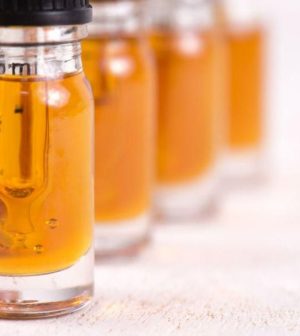- Could Your Grocery Store Meat Be Causing Recurring UTIs?
- Are You Making This Expensive Thermostat Error This Winter?
- Recognizing the Signs of Hypothyroidism
- 10 Strategies to Overcome Insomnia
- Could Artificial Sweeteners Be Aging the Brain Faster?
- Techniques for Soothing Your Nervous System
- Does the Water in Your House Smell Funny? Here’s Why
- Can a Daily Dose of Apple Cider Vinegar Actually Aid Weight Loss?
- 6 Health Beverages That Can Actually Spike Your Blood Sugar
- Treatment Options for Social Anxiety Disorder
CBD Oil Won’t Ease Pain After Kidney Stone Treatment

An approved CBD oil product will, apparently, not be the solution for patients trying to reduce pain after kidney stone treatment, a randomized clinical trial suggests.
“Urologists and patients alike are interested in finding effective alternatives to pain management after urinary stone treatment,” said senior study author Dr. Karen Stern, a urologist at the Mayo Clinic in Phoenix, Ariz. “Our study found that although treatment with CBD oil was safe, it wasn’t effective in minimizing pain or opioid use after ureteroscopy and stent placement.”
For the study, researchers tested the cannabidiol (CBD) oil product in 90 patients who were undergoing the treatment for urinary stones. CBD is a non-psychoactive component of cannabis.
Urinary stones in the kidney or ureter are a common problem. When they’re too big to pass through, they must be treated surgically using an instrument called a ureteroscope to remove or fragment the stones.
Often, a soft plastic tube called a stent is then placed to ensure that urine can drain from the kidney into the bladder until swelling in the ureter stops.
Many patients need medication, such as opioids, to manage the pain.
Opioid use after ureteroscopy is a risk factor for opioid dependence, so researchers have been trying to find alternative pain treatments.
In this study, patients were randomly assigned to three days of treatment with oral CBD oil or with an inactive placebo.
This was an “off-label” use of a CBD oil formulation approved by the U.S. Food and Drug Administration for treatment of some seizure disorders.
Patients did not experience any reduction in pain or opioid use with CBD oil, the investigators found. The patients did receive standard medications, including an opioid if needed, for severe pain. The only side effect from the CBD oil was brief, mild dizziness.
The two groups had similar pain scores after the procedure, according to the report published in the April issue of The Journal of Urology.
The average maximum pain score immediately after treatment was 2.2 on a 0-to-10 scale. Pain scores decreased over the first three days for both groups. There was never more than a half-point difference between the two groups, the findings showed.
The two groups also had no significant difference in opioid use. Most did not use their “rescue” opioid dose.
In addition, both groups had similar problems with urination and other symptoms.
“In our experience, many patients ask whether CBD could be an effective option for managing pain after [ureteroscopy] with stent placement,” Stern said in a journal news release.
“Our study provides high-quality evidence to counsel patients in this situation: While CBD oil appears safe, it does not seem to reduce pain or discomfort during the typically brief recovery period after this common procedure,” she explained.
More information
The National Kidney Foundation has more on kidney stones.
SOURCE: The Journal of Urology, news release, March 9, 2023
Source: HealthDay
Copyright © 2026 HealthDay. All rights reserved.










